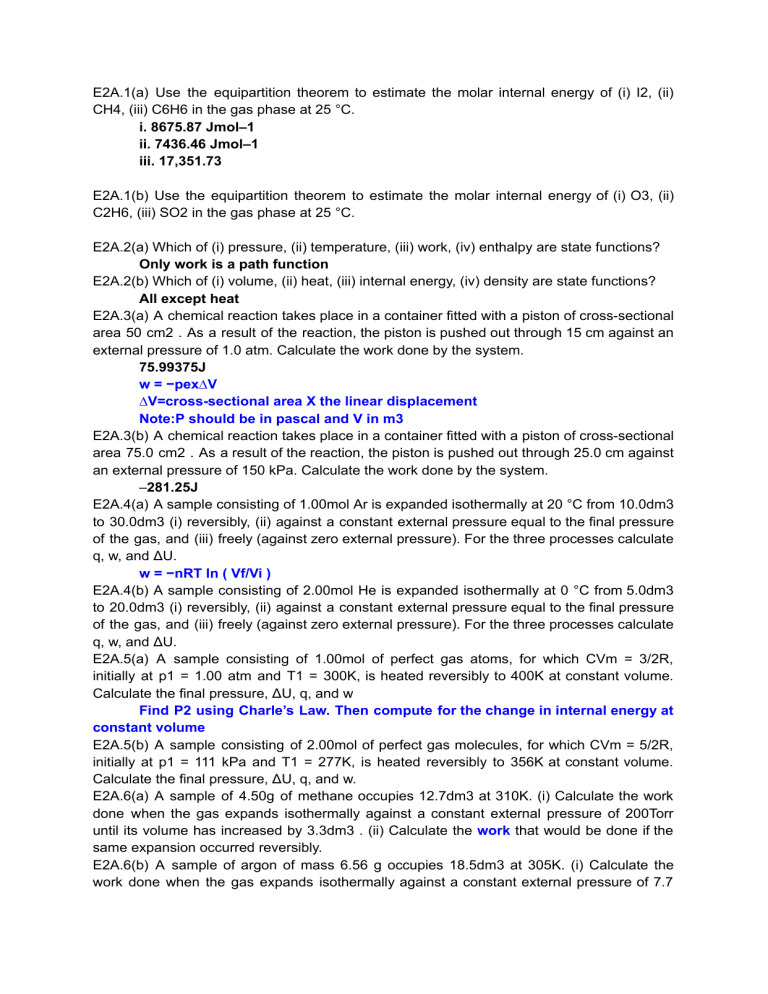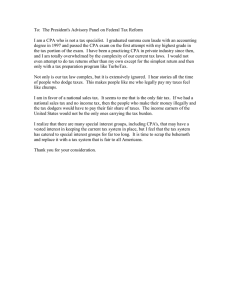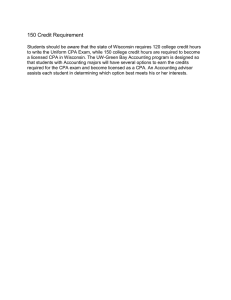
E2A.1(a) Use the equipartition theorem to estimate the molar internal energy of (i) I2, (ii) CH4, (iii) C6H6 in the gas phase at 25 °C. i. 8675.87 Jmol–1 ii. 7436.46 Jmol–1 iii. 17,351.73 E2A.1(b) Use the equipartition theorem to estimate the molar internal energy of (i) O3, (ii) C2H6, (iii) SO2 in the gas phase at 25 °C. E2A.2(a) Which of (i) pressure, (ii) temperature, (iii) work, (iv) enthalpy are state functions? Only work is a path function E2A.2(b) Which of (i) volume, (ii) heat, (iii) internal energy, (iv) density are state functions? All except heat E2A.3(a) A chemical reaction takes place in a container fitted with a piston of cross-sectional area 50 cm2 . As a result of the reaction, the piston is pushed out through 15 cm against an external pressure of 1.0 atm. Calculate the work done by the system. 75.99375J w = −pex∆V ∆V=cross-sectional area X the linear displacement Note:P should be in pascal and V in m3 E2A.3(b) A chemical reaction takes place in a container fitted with a piston of cross-sectional area 75.0 cm2 . As a result of the reaction, the piston is pushed out through 25.0 cm against an external pressure of 150 kPa. Calculate the work done by the system. –281.25J E2A.4(a) A sample consisting of 1.00mol Ar is expanded isothermally at 20 °C from 10.0dm3 to 30.0dm3 (i) reversibly, (ii) against a constant external pressure equal to the final pressure of the gas, and (iii) freely (against zero external pressure). For the three processes calculate q, w, and ΔU. w = −nRT ln ( Vf/Vi ) E2A.4(b) A sample consisting of 2.00mol He is expanded isothermally at 0 °C from 5.0dm3 to 20.0dm3 (i) reversibly, (ii) against a constant external pressure equal to the final pressure of the gas, and (iii) freely (against zero external pressure). For the three processes calculate q, w, and ΔU. E2A.5(a) A sample consisting of 1.00mol of perfect gas atoms, for which CVm = 3/2R, initially at p1 = 1.00 atm and T1 = 300K, is heated reversibly to 400K at constant volume. Calculate the final pressure, ΔU, q, and w Find P2 using Charle’s Law. Then compute for the change in internal energy at constant volume E2A.5(b) A sample consisting of 2.00mol of perfect gas molecules, for which CVm = 5/2R, initially at p1 = 111 kPa and T1 = 277K, is heated reversibly to 356K at constant volume. Calculate the final pressure, ΔU, q, and w. E2A.6(a) A sample of 4.50g of methane occupies 12.7dm3 at 310K. (i) Calculate the work done when the gas expands isothermally against a constant external pressure of 200Torr until its volume has increased by 3.3dm3 . (ii) Calculate the work that would be done if the same expansion occurred reversibly. E2A.6(b) A sample of argon of mass 6.56 g occupies 18.5dm3 at 305K. (i) Calculate the work done when the gas expands isothermally against a constant external pressure of 7.7 kPa until its volume has increased by 2.5dm3 . (ii) Calculate the work that would be done if the same expansion occurred reversibly E2B.1(a) When 229 J of energy is supplied as heat at constant pressure to 3.0mol Ar(g) the temperature of the sample increases by 2.55K. Calculate the molar heat capacities at constant volume and constant pressure of the gas. Equation for heat capacity E2B.1(b) When 178 J of energy is supplied as heat at constant pressure to 1.9mol of gas molecules, the temperature of the sample increases by 1.78K. Calculate the molar heat capacities at constant volume and constant pressure of the gas. E2B.2(a) Calculate the value of ΔHm − ΔUm for the reaction N2(g) + 3H2(g) → 2NH3(g) at 298 K. E2B.2(b) Calculate the value of ΔHm − ΔUm for the reaction C6H12O6(s) + 6O2(g) → 6CO2(g) + 6H2O(l) at 298 K. E2B.3(a) The constant-pressure heat capacity of a sample of a perfect gas was found to vary with temperature according to the expression Cp/(JK−1 ) =20.17 + 0.3665(T/K). Calculate q, w, ΔU, and ΔH when the temperature is raised from 25 °C to 100 °C (i) at constant pressure, (ii) at constant volume. E2B.3(b) The constant-pressure heat capacity of a sample of a perfect gas was found to vary with temperature according to the expression Cp/(JK−1 ) = 20.17 + 0.4001(T/K). Calculate q, w, ΔU, and ΔH when the temperature is raised from 25 °C to 100 °C (i) at constant pressure, (ii) at constant volume. E2B.4(a) When 3.0mol O2 is heated at a constant pressure of 3.25 atm, its temperature increases from 260K to 285K. Given that the molar heat capacity of O2 at constant pressure is 29.4 JK−1 mol−1 , calculate q, ΔH, and ΔU. ∆U = ∆H − nR∆T E2B.4(b) When 2.0mol CO2 is heated at a constant pressure of 1.25 atm, its temperature increases from 250K to 277K. Given that the molar heat capacity of CO2 at constant pressure is 37.11 JK−1 mol−1 , calculate q, ΔH, and ΔU.


